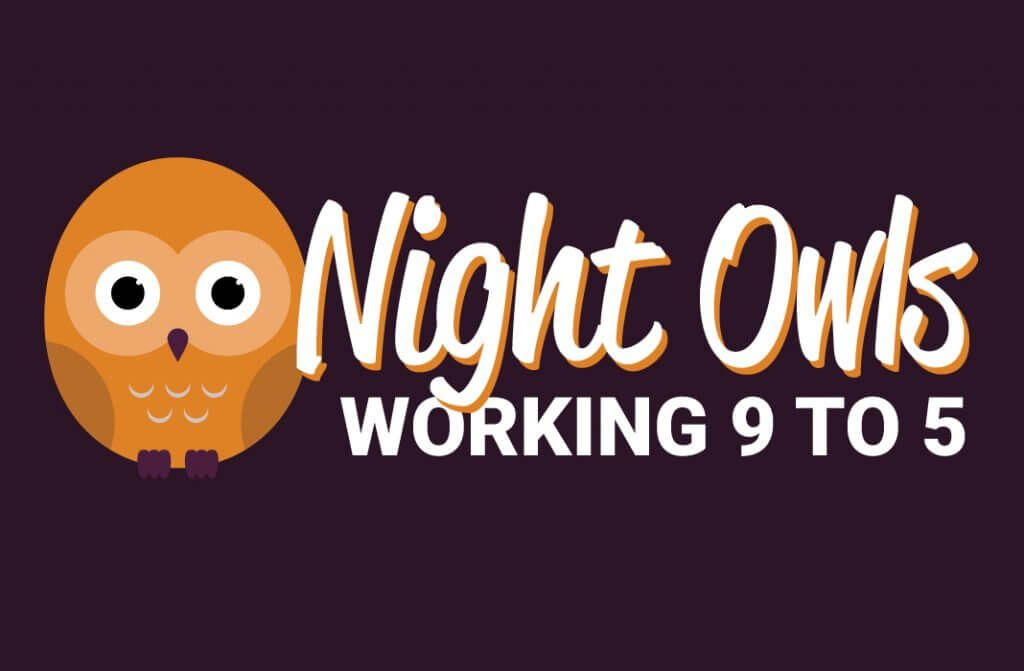Night owls working 9 to 5: rethinking how to make a livin’
Just a few days ago, most Canadians had their collective circadian rhythms jostled by the start of daylight savings time. The bi-annual ritual is one of many modern-day factors that disrupt our sleep and affect our health, alertness and productivity. Fatigue has consequences for both employers and employees; it’s with this in mind, on this World Sleep Day, that we’d like to delve into the issue more deeply.
It goes without saying that fatigued employees are at higher risks of being injured in the workplace and injuring others. Time and again, fatigue has been identified as a factor in major accidents, such as the Chernobyl and Three-Mile Island nuclear disasters as well as the Challenger space shuttle explosion. This is because sleep deprivation hampers our ability to perform higher-level cognitive functions.
Sure: employers can’t force their employees to get 7 to 9 hours of sleep every night. That said, they do have the power to implement evidence-based policies that favour a more rested workforce.
For starters, employers can recognize that their employees have different chronotypes – different ways in which their internal clocks manifest themselves. In recent years, chronotypes have been the subject of much research. The science is revealing that a person’s tendency towards being a night owl or a morning lark isn’t a matter of preference or self-discipline: it’s hard-coded in their genes.
The research finds our internal clocks are influenced by genes and are incredibly difficult to change. If you’re just not a morning person, it’s likely you’ll never be, at least until the effects of aging kick in. As we get older, our clocks nudge us to wake up earlier and earlier.
As a result, those who aren’t genetically predisposed to be early risers often have to fight their chronobiology to adapt to societal expectations, creating a perpetual social jetlag. This presents a problem for rigid employers: many of their employees simply aren’t working when they are at their most productive, alert and creative. In addition, the health implications of fighting one’s chronobiology include heart disease, diabetes, obesity, depression, anxiety – even an earlier death. There’s also evidence that social jetlag contributes to an increased consumption of stimulants (caffeine, nicotine and alcohol) among those with late chronotypes.
But some employers are embracing the science and making changes to better accommodate their employees.
Among the companies seeking to remedy the problem is Southwest Airlines, which allows pilots to choose between morning and evening flight schedules. The United States Navy recently traded an 18-hour submarine shift schedule for a 24-hour one that more closely matches sailors’ biological rhythms. And at some pharmaceutical, software and financial companies, managers expect employees to come to the office for only a few hours in the middle of the day — or to work off site entirely.
New office hours aim for well rested, more productive workers, The New York Times
Another pharmaceutical company, AbbVie in Denmark, allows its employees to craft their own schedules based on their chronotypes. The process goes beyond choosing work hours; employees go through a training program to understand how their chronotype influences their analytical and creative skills throughout the day. Empowered with this knowledge, employees can plan their workday so that they can tackle more complex tasks when they are at their cognitive peak.
In addition to the conversation around accommodation, there’s also a conversation to be had around the stigma associated with having a late chronotype. Night owls, for example, are often pigeonholed as lazy simply because they don’t thrive on the 8 to-4 or 9-to-5 schedule imposed upon them. Accommodating these employees can be as simple as allowing them to shift their schedule by a few hours and scheduling meetings at a times that work for both morning larks and night owls.
Camilla Kring is the founder of the B-society, an international advocacy group calling for increased acceptance of the evening-oriented. “I actually think we have a lot of discrimination in our society against late chronotypes,” she said. Meetings at the beginning of workdays favor early risers (whose mental sharpness peaks earlier as well).
In a world where an internet connection makes working whenever, wherever possible, she argues, companies ought to allow workers to set more flexible schedules around their ideal sleep time.
According to Kring, small changes could make a huge impact. “Just by changing your schedule by an hour or two, it can result in having more sleep, higher productivity,” she says. In this view, workplaces ought to be more accommodating of chronotypes.
Late sleepers are tired of being discriminated against. And science has their back, Vox
The labour movement has a long history of advocating and fighting for flexible work arrangements. Empowering workers with greater control over their work hours not only gives them better work-life balance, it also helps them come to work at their most productive.
A 2016 Employment and Social Development Canada survey found that 80% of employers offer flexible work arrangements, either through informal practice, workplace policy or a collective agreement.
